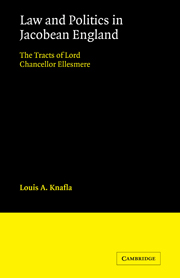Book contents
- Frontmatter
- Contents
- Preface
- List of abbreviations
- Notes on style
- Table of statutes
- Table of cases
- INTRODUCTION
- PART ONE LAW AND POLITICS
- I The Making of a Legal Mind
- II Kingship and the Problem of Sovereignty
- III Lords and Commons
- IV Reforming Privy Councillors: Crown Finances and the Administration of Government
- V The Problem of Law Reform
- VI The Clash of Jurisdictions: Central and Local Authorities, Secular and Ecclesiastical
- VII Les Enfants Terribles: Coke, Ellesmere, and the Supremacy of the Chancellor's Decree
- VIII The Provenance of Ellesmere's Tracts
- PART TWO ELLESMERE'S TRACTS
- Index of Persons and Places
- Index of Subjects and Terms
VI - The Clash of Jurisdictions: Central and Local Authorities, Secular and Ecclesiastical
Published online by Cambridge University Press: 05 January 2012
- Frontmatter
- Contents
- Preface
- List of abbreviations
- Notes on style
- Table of statutes
- Table of cases
- INTRODUCTION
- PART ONE LAW AND POLITICS
- I The Making of a Legal Mind
- II Kingship and the Problem of Sovereignty
- III Lords and Commons
- IV Reforming Privy Councillors: Crown Finances and the Administration of Government
- V The Problem of Law Reform
- VI The Clash of Jurisdictions: Central and Local Authorities, Secular and Ecclesiastical
- VII Les Enfants Terribles: Coke, Ellesmere, and the Supremacy of the Chancellor's Decree
- VIII The Provenance of Ellesmere's Tracts
- PART TWO ELLESMERE'S TRACTS
- Index of Persons and Places
- Index of Subjects and Terms
Summary
Ellesmere's keen interest in the problems of law reform had placed him in a position where he could no longer agree with some of the current developments in the expansion of the common law. One of the most outspoken supporters of these legal developments was Sir Edward Coke, and his ‘Reports’ became a landmark for the new common law which was emerging in the late sixteenth and early seventeenth centuries. It was perhaps inevitable that the Chancellor would come to sharp disagreement with the Chief Justice over a number of these issues. Coke's Reports provided the occasion for their disagreements. The Reports, together with Ellesmere's critique, represent in the broadest sense a clash of views on the jurisdiction of courts in the English legal system: central and local, secular and ecclesiastical.
Coke's Reports, published in the years 1600'15, are one of the most important collections of law reports in the early modern period. Recognised as having great authority, they contributed significantly to the development of the common law in the seventeenth and eighteenth centuries; and they rendered their author memorable in the annals of the law profession. Coke was without doubt one of the foremost legal scholars of his generation. He possessed both an infinite capacity for arduous labour and a brilliant mind. The notes which he compiled from the legal record–the plea rolls–reveal a reading and knowledge of the records that was unmatched by contemporaries; and his advice on how to study the law was widely quoted.
- Type
- Chapter
- Information
- Law and Politics in Jacobean EnglandThe Tracts of Lord Chancellor Ellesmere, pp. 123 - 154Publisher: Cambridge University PressPrint publication year: 1977
- 1
- Cited by



